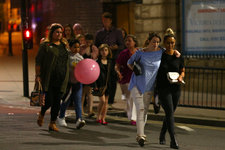 You send your kids off to a big venue, a stadium, a theatre or a park. Your thinking is that they will enjoy a fun and entertaining gathering of people to see some entertainer/performer. At the end of the day, your loved one will find their way home. But instead, something tragic happens. A terrorist, freedom fighter, disgruntled and perhaps mentally ill person has other plans for your kids or you. Why do these things happen? Well, that is a worthwhile question for the psychologist and media people to go over, after the disaster! But at that point the “why” does nothing for the pain of now!
You send your kids off to a big venue, a stadium, a theatre or a park. Your thinking is that they will enjoy a fun and entertaining gathering of people to see some entertainer/performer. At the end of the day, your loved one will find their way home. But instead, something tragic happens. A terrorist, freedom fighter, disgruntled and perhaps mentally ill person has other plans for your kids or you. Why do these things happen? Well, that is a worthwhile question for the psychologist and media people to go over, after the disaster! But at that point the “why” does nothing for the pain of now!
So how about we think about the now and the next event, the next time. How about we talk about an action plan. An escape and evasion plan, if you will.
In this day and age of terrorist bombing and shootings, criminal attacks and those by mentally ill people, you need to not wait for the after action advise of these “experts.” How about you coming up with an action plan of your own. The idea being this:
1. Leave for the event with a plan of action. What you will do if all goes as planned and how you will respond if it does not and there is an emergency. We are talking what you will do beyond running and calling anyone who answers on a cell phone.
2. Be prepared with knowledge about the location you are visiting. Know the exits, know the passageways, know the risk points. Risk points would be the narrow walkways, dark walkways, stairs, locked doors or gates and paths that lead away from where you want to go.
3. Form an action plan with the people you are with. Plan that you stick together at all times, including bathroom and food runs. If something happens, know that again, you stick together and follow a predetermined route away from danger and to safety.
4. Avoid becoming a member of the stampeding heard. The panicking crowd presents its own problems when bad things are happening. And it is likely that all those other people do not have a plan and are simply following the person in front of them. They do not know where they are going, and they will not respect your attempts to flee without interference. Know that often in terrorist incidents the attackers plan for the response after the initial attack. They intend to have a second action ready for the fleeing masses and the responding law enforcement and medical teams. The crowd could be leading you to that next attack point.
5. Have a communication plan. Know who to call and when. Collect yourself before speaking and have something constructive to say that leads to your rescue. Where you are going, how you are going, who you are with and your status are constructive points.
6. If fleeing is not easily done, know how to find “good cover.” In good cover we are talking about solid objects that will offer some protection against flying objects, bullets, bomb blasts and fragments from the blast. If there is a gunman, you will want to not be visible AND you want to be behind something that will protect you from those same objects.
7. Have a followup plan. After the initial incident, have a plan on communication, movement and getting to safety. Also consider the what if, of, if the things you planned for are not available to you.
8. Consider the concept: Run, Hide, Fight. Some may chose to sit back and be a victim in waiting. But for others, being a victim is not an option. That is you not being a victim. Survival is what matters. Run…if appropriate and available to you. Hide, if cover and concealment is available and offers the best option to you. Fight, like there is no tomorrow…like your life depended on it! Be ready, mentally and physically to take action to prevent trouble and respond to it if it happens. If it does, be ready to go the distance.
If a shark attacks you in the ocean, do you sit back and become a full or partial meal? Or do you instead let the shark know that this is going to be the worse meal it ever attempted, and the results will not be good for that shark.
9. Know this…our first responders, our law enforcement and intelligence agencies are doing their best. But they cannot always be there when you need them. They cannot know what is in the hearts and minds of the unknown sick persons out there. And their response, though as fast as can be possible, may not be enough for your particular circumstance.
10. You should consider yourself “ON YOUR OWN!” It is up to you to protect and save your own butt.
